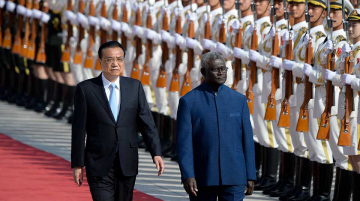
By Lukas Fiala
Earlier this week we had the opportunity to host the German Marshall Fund’s Andrew Small for a discussion about his latest book The Rupture: China and the Global Race for the Future. As the title suggests, Andrew chronicles a fascinating inside story of how large parts of Europe, the US, and their allies have come to see China as a systemic rival over the last few years. But what does this actually mean?
On the anniversary of Russia’s war in Ukraine, it should be an urgent priority to better understand the inflection points we have witnessed over the past year within the wider global context. At least on the security side, a flurry of events this week provides us with a starting point in understanding the emerging world system we are trying to conceptualize.
At last weekend’s Munich Security Conference, China’s top diplomat Wang Yi announced China’s intention of offering a peace proposal for Ukraine. On Tuesday, China’s Foreign Ministry published a Concept Paper for the Global Security Initiative (GSI), adding much-anticipated detail to what was a rather vague diplomatic idea proposed by Xi Jinping less than a year ago. Finally, as if the macabre optics of a war anniversary were not enough, China, Russia, and South Africa are also holding a joint naval exercise off the coast of Durban.
The latter is nominally justified as ‘safeguard[ing] the safety of shipping and maritime economic activities’, but the timing and substance of the operation suggest that diplomatic signaling is also at the center of the exercise. Based on official statements, the PLA Navy only sent three vessels – a guided missile destroyer, a frigate, and a supply ship – that were already part of China’s 42nd anti-piracy task force in the Gulf of Aden.
The operational status of South Africa’s navy, on the other hand, has been negatively affected by chronic underfunding and the ensuing slow progress on upgrading legacy equipment. According to official statements, only 350 personnel of the South African National Defence Force (SANDF) will participate in the drills, but Pretoria likely sees the exercise as an opportunity to reaffirm its position within the BRICS. For Russia, the event of course represents a welcome opportunity to show the West that it has partners across the Global South while flexing advanced hypersonic missiles on board the frigate Admiral Gorshkov. Yet, the small scale of the exercise and the different systems operated by Russia, South Africa, and China cast doubt over the real effect the exercises will have on interoperability of the three forces.
In the context of China’s new Concept Paper for the GSI, however, it’s hard to ignore the symbolism of the exercises for the much-touted systemic competition between China, Russia, and the West. Reading through the Concept, it becomes clear China intends the GSI to function as the central platform to coordinate security-related activities abroad. The document features a laundry list of China’s security-related activities, from the recent charm offensive in the Pacific Islands to China’s attempts at crisis diplomacy across the Horn of Africa, South Asia, and the Middle East.
While the usual emphasis on sovereignty and the UN system features heavily, the document also highlights Sinocentric venues for security dialogue such as the China-Africa Peace and Security Forum and the ambition to ‘hold high-level conferences on the GSI in due course to strengthen policy communication in the field of security’ and ‘promote intergovernmental dialogue and cooperation.’ This reflects Beijing’s growing willingness to create alternative institutional settings to discuss and shape international security.
As I’ve argued before, it seems that the GSI is becoming Beijing’s new umbrella concept to reframe China’s security commitments and engagements around the world in positive-sum terms. Similar to the BRI, which rebranded infrastructure and other development projects after their inception, the GSI seems to act as a one-size-fits-all policy framework to present China’s idea of how international security ought to work. Heavy on rhetoric and light on substance, the GSI makes it possible to talk peace in Munich while exercising with Russia in South Africa.
While the past week should instill urgency in our effort to better understand the transforming international system, the analysis suggests that the ‘system’ we are seemingly competing over is by far not as uniform as many think. To believe governments across the Global South will perceive Europe’s security concerns exclusively within the binary framework of ‘systemic competition’ is to believe in a world that no longer exists.
Lukas Fiala is the project coordinator for the China Foresight initiative at LSE IDEAS.









